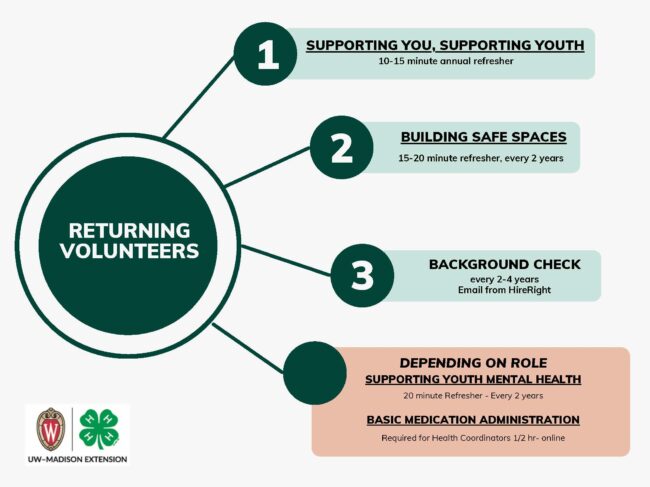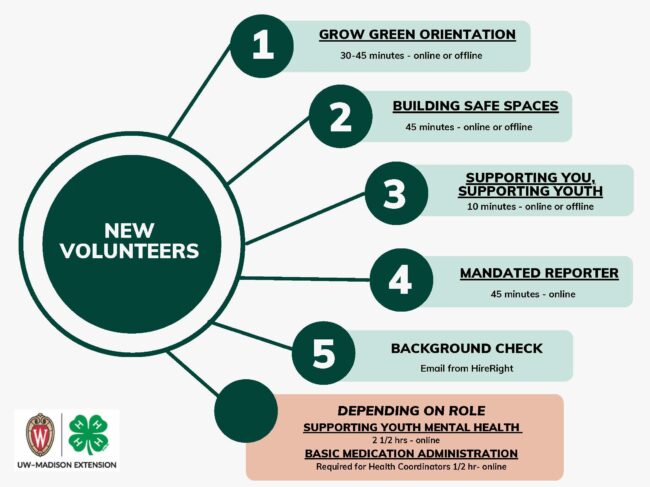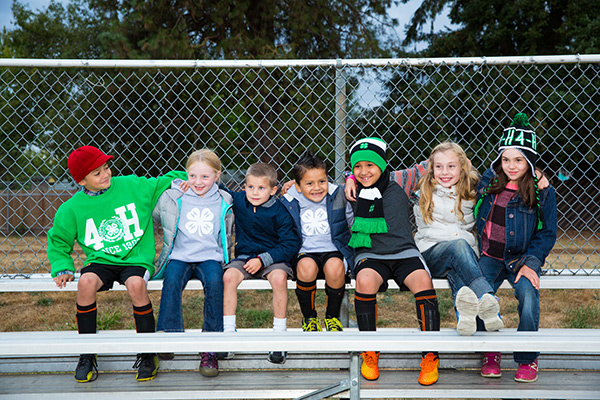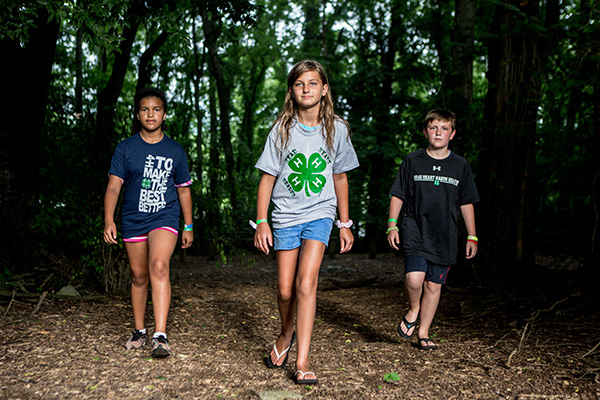Volunteer Resources & Policies

Questions?
Please contact the Polk County 4-H Educator
Lindsay Spindler
715-485-8607
Become a 4-H Volunteer Today!
Volunteers help make 4-H possible.
To volunteer, you don’t need to have previous experience working with youth. The most important qualifications are:
- a desire to work with young people to help them learn new things and gain life skills; and
- wanting to provide youth with positive experiences in a safe and welcoming environment.
Types of Volunteer Roles
In 4-H there are many ways to volunteer. All volunteers work with youth and adult volunteers in offering a positive youth development experience for young people. Check out specific volunteer opportunities below.
Activity/Event Volunteer
Provide leadership/organization for an activity or event and/or participate as a committee member
Adult Advisor/Chaperone
Work with a team of adult advisors and PYD staff to ensure youth have a safe and positive educational experience.
Club Enrollment Coordinator
Provide leadership for members and adult volunteers who are enrolling in the club or group organization
Club Leader
Provide leadership to the club or group organization
Committee Volunteer
Provide leadership for a committee and/or participate as a member of a committee, creating educational experiences for all youth engaged in the program
Project Leader
Provide leadership and organization to the project group who is learning about a specific topic.
Additional information for those who want to be an Adult Advisor/Chaperone:
Adults interested in state level chaperone and coordination responsibilities must complete an Adult Advisor Application. State level experiences may include: Citizenship Washington Focus, Space Camp, National 4-H Congress.
Chaperones – for 4-H youth development experiences must have completed the Youth Protection Process; be enrolled 4-H volunteer leaders and be over 21 years of age (for some experiences adults must be over 25).
Steps to Become a Volunteer
Long-term volunteers who take on leadership and custodial care of youth need to be certified 4-H adult volunteers and recognized by the WI 4-H Program. Adult volunteers must complete the following requirements as dictated by the State of Wisconsin in regards to working with UW-Extension youth. For a comprehensive list and access to the trainings, please visit: Training for Volunteers from WI 4-H. Below is a quick summary of what is required.
- Enroll in 4-H Online
- Background Check (every 4 years)
- Orientation Process – currently Volunteer in Preparation Training and Risk Management Training
- Safe Environment Training – currently Building Safe Spaces, Title IX, and Mandated Reporter Trainings
- Mission & Role Training – currently in development from WI 4-H.
Volunteer Resources
Leader Resource Videos
Are you a club or project leader looking for ideas? Clover Connections is new video series to help you connect with your club members, run effective meetings and much more. The videos are short and conversational – like if you walked into the office and asked a question on the topic. The videos feature relevant content that is driven by the needs and interests of our adult and youth volunteers. New Clover Connections video each week – watch our social media channels for links and more information!

Wisconsin 4-H Policies
Check Out the Wisconsin 4-H Policy Update for 2023-24
Wisconsin 4-H operates within the guidelines, policies, and procedures of the University of Madison Division of Extension and the United States Department of Agriculture. These policies are established to ensure the educational and administrative integrity of all Wisconsin 4-H programs and activities administered by 4-H staff and 4-H volunteers. Wisconsin 4-H Leadership is committed to supporting staff and volunteers by writing clear and simple policies that will standardize Wisconsin 4-H safety and risk management practices.
In addition to these policies, local county-based 4-H programs, 4-H clubs, and 4-H groups may have additional policies, rules, and/or guidelines. Please contact the 4-H Program Educator in your county for more information.














